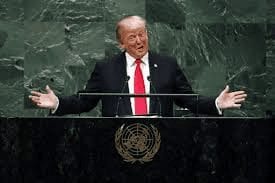If Trump’s ‘America First’ becomes ‘America alone,’ that’s bad for America – By Erin Dunne (washingtonexaminer.com) / Sept 26 2018
In his address to the United Nations on Tuesday, President Trump outlined his plans for the future of U.S. foreign policy. That plan, largely a strengthened refrain of his message last year, and far from the global leadership championed by his predecessors, echoes the ideas of isolationism and nationalism and shows a president who believes his country is better off alone.
Speaking at the General Assembly, Trump said “America is governed by Americans. We reject the ideology of globalism and we embrace the doctrine of patriotism.”
His next line, “Around the world, responsible nations must defend against threats to sovereignty not just from global governance, but also from other, new forms of coercion and domination,” implied that the U.S. would not necessarily be there backing these countries up from such threats.
Later, he added, “The United States is the world’s largest giver in the world, by far, of foreign aid. But few give anything to us,” before stating that U.S. foreign aid would be reviewed and, if countries didn’t meet the president’s standards, that it would be reconsidered.
Each of these statements highlighted that for Trump, the idea of sovereignty, a theme of his speech, was not just respecting the rights of other countries and receiving respect in return. For the president, sovereignty also meant withdrawing from global affairs: rejecting “globalism,” pulling back military and other forms of aid, and as he put it, “always act[ing] in our national interest.”
Although that might not exactly be flat-out isolationism, Trump’s plan for the future of U.S. foreign policy is one that takes a step back from its global commitments and reviews what is actually good for America, rather than what is more broadly good for the world.
If “America First” becomes “America alone,” as Trump’s talk would suggest, then clearly the U.S. will continue to step down from its current role of global leadership. That will lead to one of two outcomes: the emergence of a fragmented order dominated by regional powers, or another country stepping up to fill the vacancy left by the U.S.
A likely contender for either regional power or to be the successor of the United States is China.
Already, China has been exhibiting a growing interest in the institutions of international governance like the World Trade Organization and the United Nations. Chinese diplomats have made quiet but aggressive moves to have more of a say in policy and decisions to the benefit of Beijing. When it comes to foreign policy, China is aggressively engaging with other countries and promoting international aid through programs like the Belt and Road Initiative.
Although China is far from a perfect ally, Trump’s wavering support of allies and promises to reconsider foreign aid and trading partners have already pushed one time staunch allies to look to Beijing for trade deals.
That look east to Beijing leaves only one question then: is if China is ready. Right now, with domestic tension over its rapid expansion abroad and persistent issues of inequality yet to be resolved, it doesn’t quite seem to be there.
In a few years or perhaps a decade, it may well be. Then, it will be much too late for Trump to realize his error, as Beijing will have already established itself as Washington’s replacement and “America First” will be the policy that made America second.
Of course, it doesn’t have to be like that. Instead, Trump could forge a path of engagement where China’s rise does not replace the U.S. but compliments it making both countries and their people better off. Right now, though, that seems pretty far from reality, as Trump’s speech also championed his ongoing trade war with Beijing and his latest round of tariffs, which only deepens the divide between China and the U.S.




















